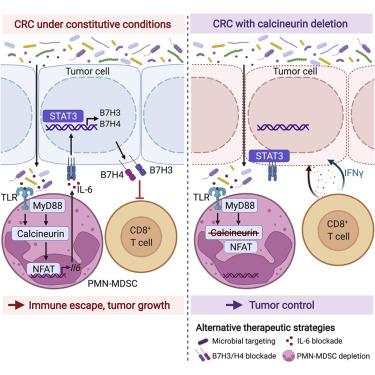Immunity ( IF 25.5 ) Pub Date : 2022-03-31 , DOI: 10.1016/j.immuni.2022.03.008 Kenneth Peuker 1 , Anne Strigli 1 , Daniele V F Tauriello 2 , Alexander Hendricks 3 , Witigo von Schönfels 4 , Greta Burmeister 3 , Mario Brosch 1 , Alexander Herrmann 1 , Sandra Krüger 5 , Jessica Nitsche 1 , Lea Južnić 1 , Marc Marius Geissler 1 , Andreas Hiergeist 6 , André Gessner 6 , Jakob Wirbel 7 , Ruby Priyadarshini Ponnudurai 7 , Antje Tunger 8 , Rebekka Wehner 8 , Daniel E Stange 9 , Jürgen Weitz 9 , Daniela E Aust 10 , Gustavo B Baretton 11 , Marc Schmitz 12 , Christoph Röcken 5 , Jochen Hampe 1 , Sebastian Hinz 3 , Georg Zeller 7 , Triantafyllos Chavakis 13 , Clemens Schafmayer 3 , Eduard Batlle 14 , Sebastian Zeissig 1

|
Bacterial sensing by intestinal tumor cells contributes to tumor growth through cell-intrinsic activation of the calcineurin-NFAT axis, but the role of this pathway in other intestinal cells remains unclear. Here, we found that myeloid-specific deletion of calcineurin in mice activated protective CD8+ T cell responses and inhibited colorectal cancer (CRC) growth. Microbial sensing by myeloid cells promoted calcineurin- and NFAT-dependent interleukin 6 (IL-6) release, expression of the co-inhibitory molecules B7H3 and B7H4 by tumor cells, and inhibition of CD8+ T cell-dependent anti-tumor immunity. Accordingly, targeting members of this pathway activated protective CD8+ T cell responses and inhibited primary and metastatic CRC growth. B7H3 and B7H4 were expressed by the majority of human primary CRCs and metastases, which was associated with low numbers of tumor-infiltrating CD8+ T cells and poor survival. Therefore, a microbiota-, calcineurin-, and B7H3/B7H4-dependent pathway controls anti-tumor immunity, revealing additional targets for immune checkpoint inhibition in microsatellite-stable CRC.
中文翻译:

骨髓钙调神经磷酸酶-NFAT通路的微生物群依赖性激活抑制结直肠癌中B7H3和B7H4依赖性抗肿瘤免疫
肠道肿瘤细胞的细菌感应通过钙调神经磷酸酶-NFAT轴的细胞内在激活促进肿瘤生长,但该途径在其他肠道细胞中的作用仍不清楚。在这里,我们发现小鼠中钙调神经磷酸酶的骨髓特异性缺失激活了保护性 CD8 + T 细胞反应并抑制了结直肠癌 (CRC) 的生长。骨髓细胞的微生物感应促进了钙调神经磷酸酶和 NFAT 依赖性白细胞介素 6 (IL-6) 的释放、肿瘤细胞共抑制分子 B7H3 和 B7H4 的表达以及 CD8 + T 细胞依赖性抗肿瘤免疫的抑制。因此,靶向该途径的成员激活了保护性 CD8 +T 细胞反应并抑制原发性和转移性 CRC 生长。B7H3 和 B7H4 由大多数人类原发性 CRC 和转移灶表达,这与肿瘤浸润性 CD8 + T 细胞数量少和存活率低有关。因此,微生物群、钙调神经磷酸酶和 B7H3/B7H4 依赖性途径控制抗肿瘤免疫,揭示了微卫星稳定 CRC 中免疫检查点抑制的其他靶点。











































 京公网安备 11010802027423号
京公网安备 11010802027423号